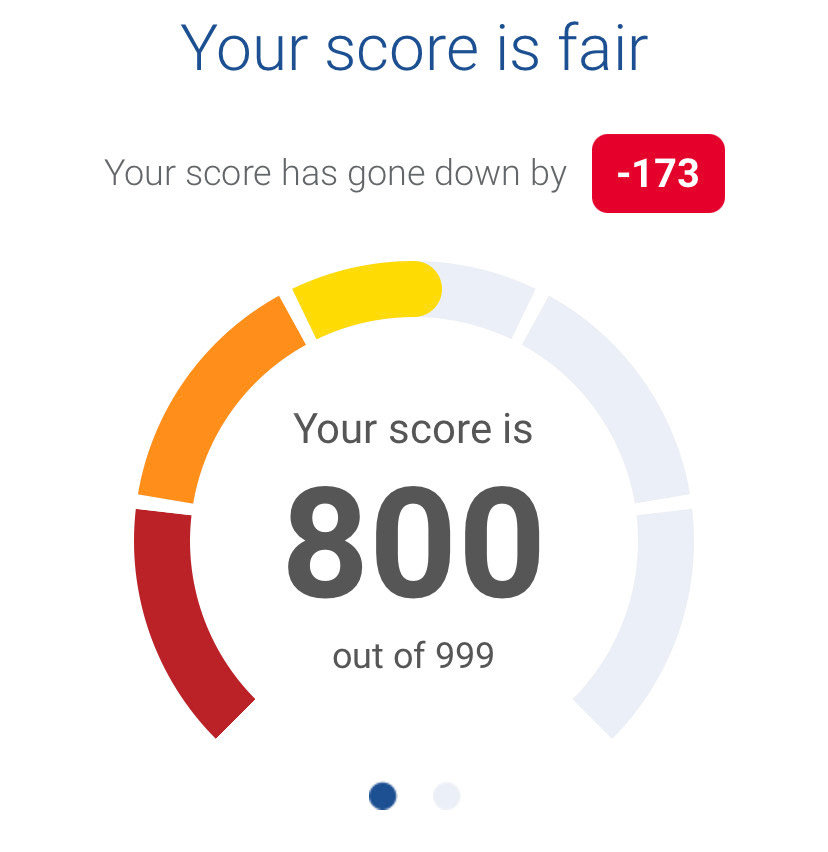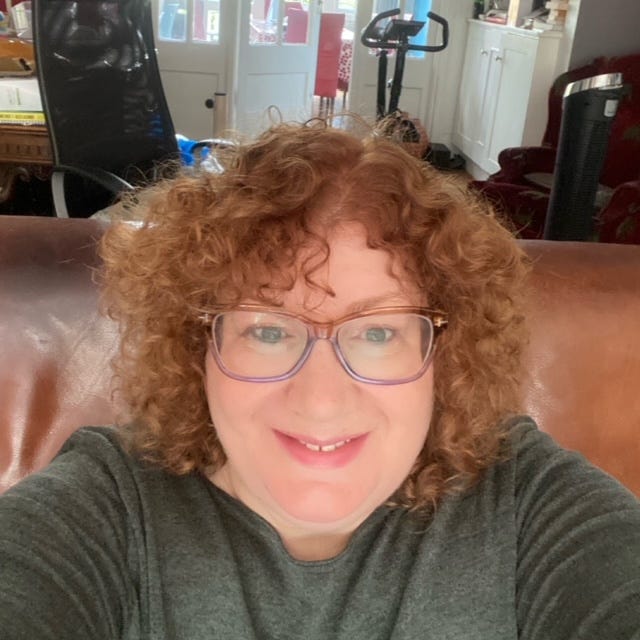"Sometimes you might have to walk away before they realise just how valuable you are."
Authors & Money
Authors & Money is a short series of interviews with authors, inspired by author Lindsay Galvin.
I’ll be posting as usual on Mondays with an additional Thursday interview post until I run out of authors.
This week I checked my credit score and found that it had plummeted.
I posted about my credit score in one of the earliest newsletters and how I’d worked really hard to improve it. It was at 982 out of 999 and I really wanted to get it to 999! How satisfying! What an achievement. And instead, look at it.
I’m not even in the green anymore! It’s still ‘fair’ which is fine. But it’s dropped by 173 and that’s entirely because I no longer have a mortgage. So I don’t know how it’s ever going to go back up again, because I don’t know how I’ll ever have a mortgage again.
It’s not something I’d given a great deal of thought to, tbh. I was so focussed on selling the old house and actually being able to rent somewhere. And I don’t know if I ever will want to buy again - my last home owning experience didn’t exactly fill me with enthusiasm - but it burns a little to think I probably can’t because even if I somehow earn enough money to be considered, my age will likely count me out.
I really like Rowan Mangan’s Substack, Wild Inventures, and this post, The Joy of Getting to Zero, resonated.
“I used to feel that I was just managing a series of deficits,” Julie told me. “Financial deficits, emotional deficits, whatever. But as I reached my mid-forties, I realized that I’m not trying to close a gap anymore. I’m finally able to step forward. Now I’ve sorted my shit out, I can start.”
This is how I feel. Like I’m just getting started. And I certainly don’t feel my age. So it’s hard to think that it’s already too late for so many things. I guess it means I have to focus on the things that are available to me and not worry about any that aren’t.
Keren David
Keren left school at 18 and got a job as an editorial assistant at the Jewish Chronicle. She was then apprenticed as a reporter, and had a career in national newspapers, including stints at the Independent and the Sunday Times. Her first YA book, When I Was Joe, was published in 2010. She has written 12 novels and is currently Associate Editor (Features) back at the Jewish Chronicle.
Why do you think women are often reluctant to talk about money?
I’m not sure it’s just women. I think there’s a culture in the UK of treating money as a secret…too vulgar to talk about. Of course this plays into the hands of the richer classes, who’d prefer it if most of us didn’t compare salaries or deals.
Added to this it seems that a lot of women suffer from imposter syndrome and don’t feel confident about asking for money… or their careers have been interrupted by having children and they’ve lost ground. So there’s a layer of shame in feeling embarrassingly underpaid and under valued.
I don’t talk about money much because I am Jewish and I am very well aware that there are massive antisemitic tropes about Jews and money. So I think that’s really messed up my ability to talk (or even think) sensibly about money.
When you first became aware that it was difficult to talk about money, being Jewish? Do you remember how you first learned about the tropes?
I can't remember when I first learned about the tropes, but they were always there - Jewish people (us) were 'mean' but also 'wealthy' - we were neither.
It made me hyper embarrassed around money and determined not to appear either too generous (look at the wealthy Jew!) or too ungenerous (look at the mean Jew!).
It took years to understand the truth behind those tropes - the ways in which Jews through history were punished and persecuted economically as well as violently.
There is a lot of poverty as well as some wealth in my family tree, and my great-grandparents were penniless immigrants. My parents always stressed that people might judge Jewish people by the way we acted, so I felt a big burden of responsibility on my shoulders. My way of dealing with it throughout my life has been to deliberately not think about money - I find it really hard to focus on anything to do with it - which is obviously not great. I think I've got over it a bit now.
I find it bizarre and depressing that my husband had people throw pennies at him in the bar at his Oxford college, and then 20 years later my son had the same thing happen on his way to his Jewish school in London.
What’s your earliest money memory?
We had a swing in our garden and I loved jumping off it when it was at the highest point ( which now seems quite dangerous to me!) And one day I jumped and ripped my school uniform skirt. So Mum said I mustn’t do it again, but the next day I did and ripped my other school uniform skirt. She took all the money from my piggy bank to pay for a new one...eight shillings. I cried and cried and cried.
What is your relationship with money currently?
I found it really difficult to be a full time writer, because my husband is also freelance so our income was completely unpredictable. Also by writing contemporary YA I was not always making very commercial choices. So when I was offered a job in journalism six years ago I took it, and now I work five days a week.
During lockdown all my husband’s work dried up and also recently he broke his shoulder and couldn’t work. So although he earns well when he can work, my regular salary is very important to us.
We have always shared everything, sometimes I earn nothing, sometimes he does. We started off earning around the same and now (we’ve been married 28 years) we probably will earn about the same this year.
You've had a long career in a tough sector. Do you have any advice?
My advice would be: know your own value. Not in an emotional 'I'm so hard-working and loyal, why aren't they rewarding that?' way (sadly, it never works), but in a forensic, 'what would they have to pay someone else to do my job, how easy would it be to find that person' kind of way.
Ask your colleagues the awkward questions about what they earn. Keep an eye on job ads, talk to recruitment specialists. Apply for jobs, just to see what other people might pay you. Don't get too cosy with any one employer. Sometimes you might have to walk away before they realise just how valuable you are.
How about negotiating book deals? How would you like publishers to support authors? What could be different?
I think publishing is very much set up on the basis that an author is going to have an independent income of some sort. Not just authors - publishing salaries are very low as well, compared to other sectors. I remember one publisher floating the idea of a book tour, and I asked if I'd be paid, and I'd clearly said the wrong thing! But it was a week of my time, and everyone else involved would be paid...
I think very often publishers assume you have more money than you have, and it's really something to discuss with your agent whose job it is to keep everyone's expectations realistic and fair. A good agent's job goes beyond just selling the books, there's also an element of career planning.
My agency specialises in foreign rights, and I like that, I've always thought the way to broaden your income is through international deals. And sometimes it's the foreign editions that bring things like literary prizes that don't happen for a book in its home market.
I'd advise new authors to be prepared to work part time alongside a writing career, or prioritise very commercial work. See it as starting up a side hustle business, rather than providing a steady income.
I was once at a Society of Authors event and there was a pie chart which showed the YA market as a tiny slither of the children's market, which was itself a slither of the book market and - the penny dropped - I thought, oh, I'm writing for a really tiny niche market. Duh!
It's easy to get carried away with dreams of a Netflix deal or whatever. In reality, the more artistic freedom you want, the less financial freedom it will give you. Unless you're very lucky. I consider myself very fortunate to have had more than a decade of book contracts. Still waiting for the big money, but in that time I've seen a lot of careers crash and burn because the huge advance failed to turn into big sales. (Although now, I am ready for that big advance. Bring it on)
What’s the biggest money mistake you’ve made?
I have never ever prioritised money in any career decision, which was probably a bit mad. But it’s never too late, is it? (Ever the optimist). Also there was the house we didn’t buy (see below).
What’s the best thing you’ve ever spent money on?
We bought a house in north London in 1995, lucky us, which is now worth a lot more than we paid for it. We were both 32, both earning reasonable salaries, husband had saved up a deposit, but stupidly we pulled out of buying another house which cost a bit more but was in a better area and is now worth about a million pounds more than our house. So there’s always a bit of a yes, but… about our house.
Other than that, we lived in Amsterdam for eight years and before coming back to London we splashed out on a six week holiday to Australia, Cambodia and Thailand. And then came back to London and neither of us had jobs and we had some scarily lean years…but I never regretted it. It was a fabulous adventure and created great memories with the kids.
In 2008 I spent £140 on a course in Writing for Children at City University. Best investment ever! From that course (and another one following it for the same money) I wrote my first book and launched a new career.
What would you do with £10,000?
I have a plan to make cupboards in my living room. I am convinced it will transform my life. Anything left over (surely it can’t cost that much?!) will go towards our energy bills.







